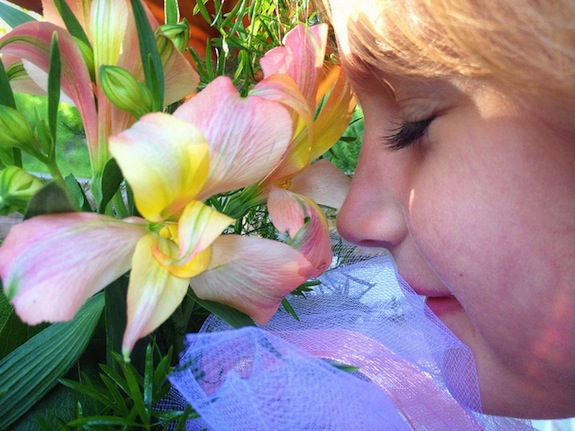Why Do Flowers Smell Good?
Humans have loved flowers for millennia, for both their looks and their scents

Image: Nate Swart
Why do flowers smell? It’s not for us, really. Scienceline reports:
Unsurprisingly, many flowers emit scents to aid reproduction. Some flowering plants are generalists and use their odors to entice a host of insects and birds to fertilize their flowers. Others specialize, releasing scents that only appeal to a particular insect. The Soaptree yucca, for example, emits an aroma that attracts a single, aptly named species of yucca moth. As pollinators travel from flower to flower, they collect and deposit pollen, fertilizing the plants.
But, as with most natural phenomena, humans have figured out ways to steal the flower’s power. Scienceline writes about the Persian physician Ibn Sina, who distilled roses into aromatic oils thousands of years ago:
He placed the flowers in a heated chamber to create a vapor of scented oil and water; after the steam condensed Ibn Sina collected the oil that floated to the top of the watery mixture. Until the past few decades, however, the biochemical process of scent production remained a mystery. In 1953, chemists knew of 20 chemicals in a rose’s fragrant bouquet; by 2006, they had discovered roughly 400.
And in fact, the history of cultivated scents probably goes back even further. A History of Scent explains the importance of perfume to the Egyptians, probably the first people to use perfume as a cultural resource. Here’s a distillation:
From the religious ceremonies involving the burning of incense to the embalming of the dead, perfume was an integral part of the Egyptian life. “The most important perfume used by the Egyptians was the kyphi. Scholars claim that when the tomb of Tutankhamen was opened, this was the odor that issued forth” (Kaufman, 1974, p. 34). But even scents like the fragrant myrrh were considered more precious than gold.
What actually makes the smell? It depends on the species. Some plants produce scents from their petals. Others, like orchids, have special smelly organs just for attracting their pollinators. Orchids, in fact, attract an entire group of bees (called, simply, orchid bees) that fly around the forest collecting orchid scents to mix up and create their own unique perfume.
If this sounds like the bees knees to you (and orchid bees store their perfumes pretty close to their knees, actually) you could even become a perfume chemist—if you’re good at keeping secrets. Every scent is heavily protected by its creator, like a secret family recipe. The Perfume Reporter writes:
The perfume industry makes the CIA look like an open book.
To protect formulas, perfume experts rely on one ancient and one modern technique. The ancient technique is secrecy. You could probably get the formula for Coca-Cola more easily than you could dig up the ingredients for a hot new scent. “Noses,” the people who invent the scents, work in secrecy and often lead extremely low-profile lives despite the fact that they are highly sought after professionals.
Here at Smithsonian, we profiled a third generation “nose” who said:
There is a lot of competition in this business, and there is so much money involved. I have such pressure on my shoulders. When I am trying to create a fragrance, sometimes I have no answer, but I have to find one in perhaps one hour. At these moments, I feel as if I am near a black hole, and I feel really alone. It’s funny because I just have to go outside and have a walk. Coming back, I’m OK. I have the answer.
And perfumes show up all around, even in the absence of flowers wooing a potential pollinator or humans wooing a potential date. Companies know all about how humans respond to scents and use them liberally in their stores. Hospitals and nursing homes scent their halls. Here’s Scienceline again:
Flower volatiles can do more for humans than just cover up stink. Caregivers who practice aromatherapy apply flower oils to stop everything from headaches to the lasting effects of torture.
Looks like it’s time to listen to what your nose knows.
More from Smithsonian.com:
/https://tf-cmsv2-smithsonianmag-media.s3.amazonaws.com/accounts/headshot/Rose-Eveleth-240.jpg)
/https://tf-cmsv2-smithsonianmag-media.s3.amazonaws.com/accounts/headshot/Rose-Eveleth-240.jpg)